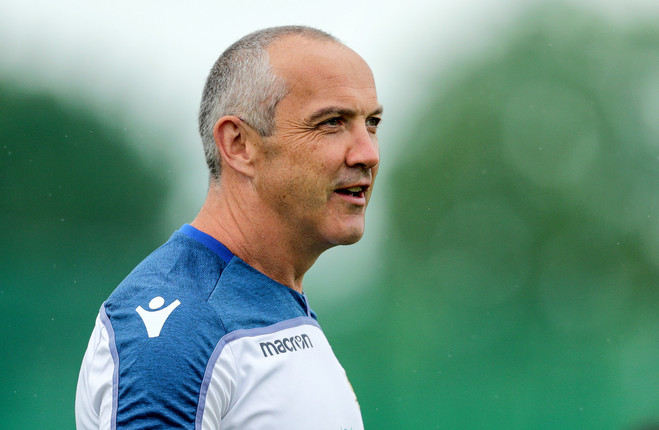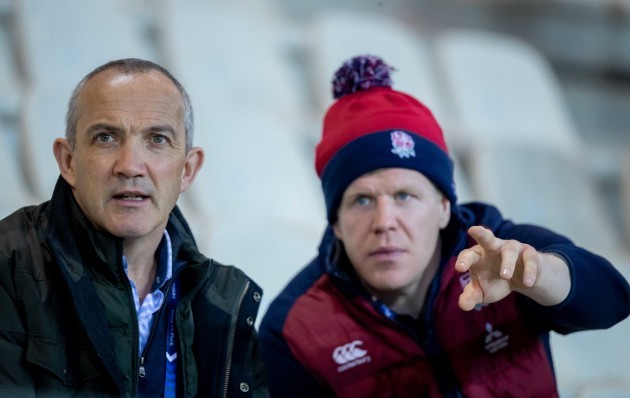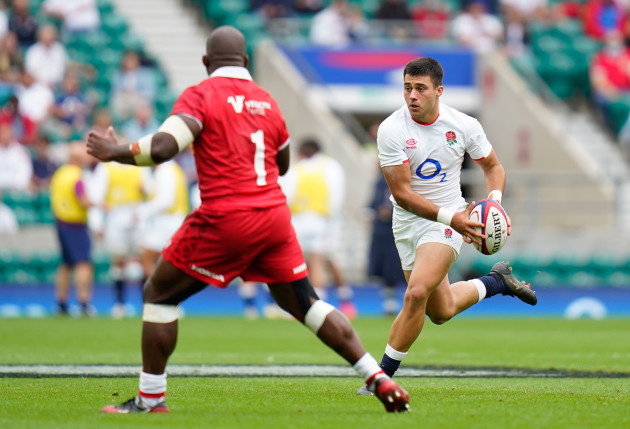CONOR O’SHEA PLAYED all of his professional rugby outside his native Ireland and his post-playing career in the sport has also seen him employed exclusively abroad, mainly in England.
His latest role is as the RFU’s ‘director of performance rugby,’ a job that revolves around ensuring English teams are successful in the international game.
O’Shea’s gig is essentially the same as what David Nucifora is employed to do as the IRFU’s performance director.
The Irishman had three years in charge of Italy from 2016 to 2019 but felt that project had run its course and the RFU brought him back on board, having previously employed O’Shea as its director of regional academies from 2005 to 2009.
His current job with the English union is wide-ranging but one central aspect is ensuring that the player development pipeline is in healthy condition. Today saw the launch of a new document called the ‘England Rugby Development Framework,’ in which O’Shea and the RFU have outlined some of the attributes they look to develop in players as they progress through the English rugby pathway.
“Every journey is unique,” is plastered across the page early on in the document and O’Shea stresses that “this is not supposed to be a bible and an exact science, but it’s framework for people as they develop and evolve to check where they are on that road.”
One section highlights positional requirements for props, hookers, second rows, flankers, scrum-halves, fly-halves, centres, wingers, and fullbacks. Second rows, for example, require skills in the lineout, maul, scrum, restart, pressure on kickers, and reading the flight of the ball.
More interesting is the part of the document regarding “psychosocial considerations” where 15 behaviours that O’Shea says they “know are really important” in players are highlighted.
They are as follows: highly self-aware, exceptionally committed, has personal high standards, detail and process-orientated, focused on mastery and performance, able to capitalise on opportunities, seeks challenges, highly adaptable, engaged in own learning and development, effectively manages or controls emotions, self-focused but also an effective team player, dedicated to personal development, effectively utilises rest and recovery, recognises and uses social support, and manages expectations and perceptions of others.
Young players don’t need to have all of these things, says O’Shea, but they are important characteristics that can be developed in the same way physical, technical and tactical skills can be.
Speaking about the “specific attention” being given to ensuring the English pathway develops leaders, O’Shea expresses a concern that young people are “spoon fed” and not given enough freedom to make their own decisions.
The new RFU document also outlines that all rugby up to and including U18 level should be about helping players to “explore the boundaries of their capabilities.”
At U20 level, it’s about “tactically adapting to win” and then senior rugby is simply about winning.
As they launched the framework, O’Shea and the RFU’s Don Barrell – the ‘head of performance pathways and programmes’ – outlined their hope that it can ensure a cohesive approach to developing an “oversupply” of talent for England’s international teams.
“There’s obviously the here and now, the build-up to the 2023 World Cup,” says O’Shea, “but what we’ve got coming up behind is a group of players that if carefully managed and working with the clubs in the right way, there is a really, really strong pipeline. It’s incredibly exciting.”
The English game will always benefit from its relatively large numbers of players but there is an ever-increasing threat of players being lured away due to family connections elsewhere.
O’Shea knows very well how interested the IRFU is in finding Irish-qualified players in England through its IQ Rugby and Exiles systems.
The Scottish Rugby Union has a similar SQ programme and has had some recent success with bringing young players into the Scotland fold, but O’Shea says the RFU aren’t overly worried.
“It’s just a fact of life. Some of it is relationships, you get bonds with people early. Some of it is a choice by a player and no matter what you do, there will be a parental pull or an emotional pull.
“When Don and myself sat down after I came back from Italy, our big driver was relationships. If you have quality coaching and great relationships with people, that interaction with players and bond you get, then players will generally want to stick with it. If players do get drawn away, that’s life.”
Whatever about Ireland and Scotland’s plans, O’Shea is thoroughly invested in what English rugby is doing to be the best in the world.
“We want to win World Cups,” says O’Shea. “Our job is to infuse and hopefully support Eddie Jones in these next two years and hopefully there will be an infusion coming from beneath.”



